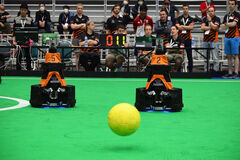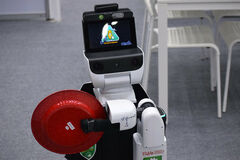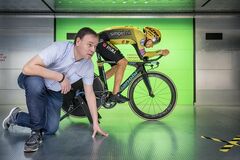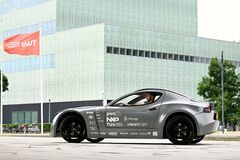A look back at the summer break
The worst of the heat is behind us for now, the new academic year is almost upon us and Cursor is back from its summer break. In order to get back into the groove of things, we made an overview of the most important TU/e related news that you had to miss out on this summer.
Victorious robots
Before the pandemic it used to be a regular item in our summer news overview, and after two summers lost to the Covid-19 pandemic, they took the victory again: the soccer robots created by Tech United once again proved to be the best in the world in the Middle Size League at RoboCup 2022. The final in Bangkok was an all-Dutch affair: the Falcons created by the business team of chip machine manufacturer ASML in Veldhoven were crushed by a whopping 15-0. However, the traditional closing match against a team of human opponents ended in a 2-3 loss.
During the same event, service robot HERO also managed to claim the highest honor in the @Home competition. The Korean team TidyBoy’s robot put up a formidable fight by preparing a very nice smoothie, but was ultimately trumped by HERO's attentiveness and communication skills.
Successful cyclists
Another annual phenomenon: the Tour de France and the associated focus on Bert Blocken’s aerodynamics research. The Flemish TU/e professor and cycling enthusiast has been working with the Jumbo-Visma team since 2018, which performed exceptionally well at this year’s French cycling race with six stage wins and wins in both the general and mountains classification (both by Danish leader Jonas Vingegaard) plus the green jersey for the points classification (by all-rounder Wout van Aert, who also won three stages, including the final time trial).
Based on tests conducted in ‘his’ wind tunnel at TU/e’s campus and advanced computer calculations, Blocken offered advice on the most aerodynamic riding position and the optimal cycling clothing. To this end, all the leading members of the successful cycling team were measured in the wind tunnel and life-size replicas were used for even more accurate results. According to the professor, the end is not yet in sight: in the coming decades, he expects aerodynamic innovations in race cycling that will yield “significant seconds of time gain”.
CO2-sucking car
An electric car that does not emit any CO2 may not be very special. But student team TU/ecomotive is taking things a step further: their new passenger car Zem actually absorbs CO2: the car extracts it from the outside air while driving, using a special filter, for which a patent is pending. For the time being, this amounts to one gram of CO2 per ten kilometers, but the team expects to be able to increase the capacity of the filter. The ultimate goal is to design a car that is CO2 neutral across its entire lifecycle. Therefore, the prototype is made of 3D printed circular plastics.
Change of deans
Finally, some internal news: just before the summer break, TU/e’s Executive Board ratified the appointment of three new deans. At Mechanical Engineering, Professor of Polymer Technology Patrick Anderson will succeed veteran Philip de Goey, who has served three terms. At Mathematics and Computer Science, Professor of Statistics Edwin van den Heuvel will become the new dean. Van den Heuvel was already vice dean and replaces Johan Lukkien, who has held the position of dean since 2017. Lastly, at Applied Physics, Gerrit Kroesen will pass on the torch to Kees Storm, who is currently leading the Soft Matter and Biological Physics group. Storm returns from a sabbatical in the United States and, among other things, he gets to help oversee the merger of his department with the Eindhoven School of Education.







Discussion